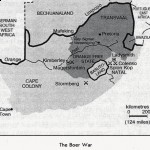The Boer War
Category: 19th century A relative lack of interest in empire during the mid-Victorian years gave way to increased concern during the 1880′s and 1890′s. The raising of tariff barriers by the United States, Germany and France made colonies more valuable again, ushering in an era of rivalry with Russia in the Middle East and along the Indian frontier and a “scramble for Africa” that involved the carving out of large claims by Britain, France and Germany. Hong Kong and Singapore served as centres of British trade and influence in China and the South Pacific. The completion of the Suez Canal in 1869 led indirectly to a British protectorate over Egypt in 1882. Queen Victoria became empress of India in 1876, and both Victoria’s golden jubilee (1887) and her diamond jubilee (1897) celebrated imperial unity.
A relative lack of interest in empire during the mid-Victorian years gave way to increased concern during the 1880′s and 1890′s. The raising of tariff barriers by the United States, Germany and France made colonies more valuable again, ushering in an era of rivalry with Russia in the Middle East and along the Indian frontier and a “scramble for Africa” that involved the carving out of large claims by Britain, France and Germany. Hong Kong and Singapore served as centres of British trade and influence in China and the South Pacific. The completion of the Suez Canal in 1869 led indirectly to a British protectorate over Egypt in 1882. Queen Victoria became empress of India in 1876, and both Victoria’s golden jubilee (1887) and her diamond jubilee (1897) celebrated imperial unity.
The conflict with the Boers in southern Africa is the most characteristic event in British colonial policy of the period. Though it is traditional to speak about the Boer War of 1899-1902, there were really two Boer Wars.
The close of the Napoleonic Wars left Britain as a ruler of a community of Dutch farmers, the Boers. For Britain the Cape Colony was only important as a point of call on the way to India, and the Boers soon began to complain bitterly of official neglect and misgovern-ment. When slavery was abolished in 1834 they believed that they had been cheated out of a large part of the compensation due to them, and two years later thousands of them began the “Great Trek” northwards to form independent republics outside the regions claimed by the British.
The situation was complicated by a great southward movement of the exceptionally well organized and warlike tribes, the Zulus and others, who drove out the more peaceful Hottentots and for a number of years contended on almost equal terms with the Boers and British. As the result of this movement the British were drawn into the interior, outflanking and surrounding the Boers, which made a conflict between the Boers and British almost inevitable.
The first conflict in 1880-1881 began after Britain had annexed the Transvaal and the Orange Free State in 1877. After making repeated attempts to repeal annexation, the Boers, as the Dutch settlers in southern Africa were called, revolted and secured limited self-government. After gold and diamonds were discovered in the Transvaal, tensions between native Boers and British settlers, aggravated by guerrilla raids of the Boers and the repressive policies of the British Governor of the Cape Colony, became more intense.
The Boers resented the growing power of the British in southern Africa and this led to war between the two groups of European settlers.
The British had a big army, and their empire behind them. The Boers were farmers who knew the land. They were good shots and tough fighters. After the Boers attacked the Cape Colony and Natal in 1899, the second Boer War, which lasted until 1902, was underway.
The British, badly equipped and entirely unprepared for the kind of fighting that had to be done, suffered three defeats during the Black Week, 10-15 December 1899. British forces at Ladysmith, Mafeking, and Kim-berley were surrounded and besieged until relieved by counter-attacks by forces under Lord Cecil Rhodes.
British troops swept into the Boer lands. But the Boers started a prolonged guerrilla war against the British. They hid in their farms and ambushed British troops. The British responded by burning farms and by putting Boer civilians in concentration camps where diseases killed thousands.
The war dragged on for two more years. Over 7,000 Boers were killed, and 28,000 more died in camps. British losses were also considerable: 22,000 died. Peace was made in Vereeniging in May 1902. The Boers were able to make peace on terms which the British had refused to consider a year earlier.
The Boers and British together were only a small white minority in the middle of a black African population, and for this reason once the supremacy of the British had been established, it was necessary to do all that was possible to conciliate the defeated. The Boers received Dominion Home Rule in 1906 and in 1909 the Union of South Africa was constituted. The great bulk of the white population was united on the fundamental point of preserving their position as a ruling race exploiting a subject coloured population. So far as the treatment of the Africans was concerned there was little to choose between Boers and British and the natives were herded into reserves and compounds and kept in a state not far removed from actual slavery.
